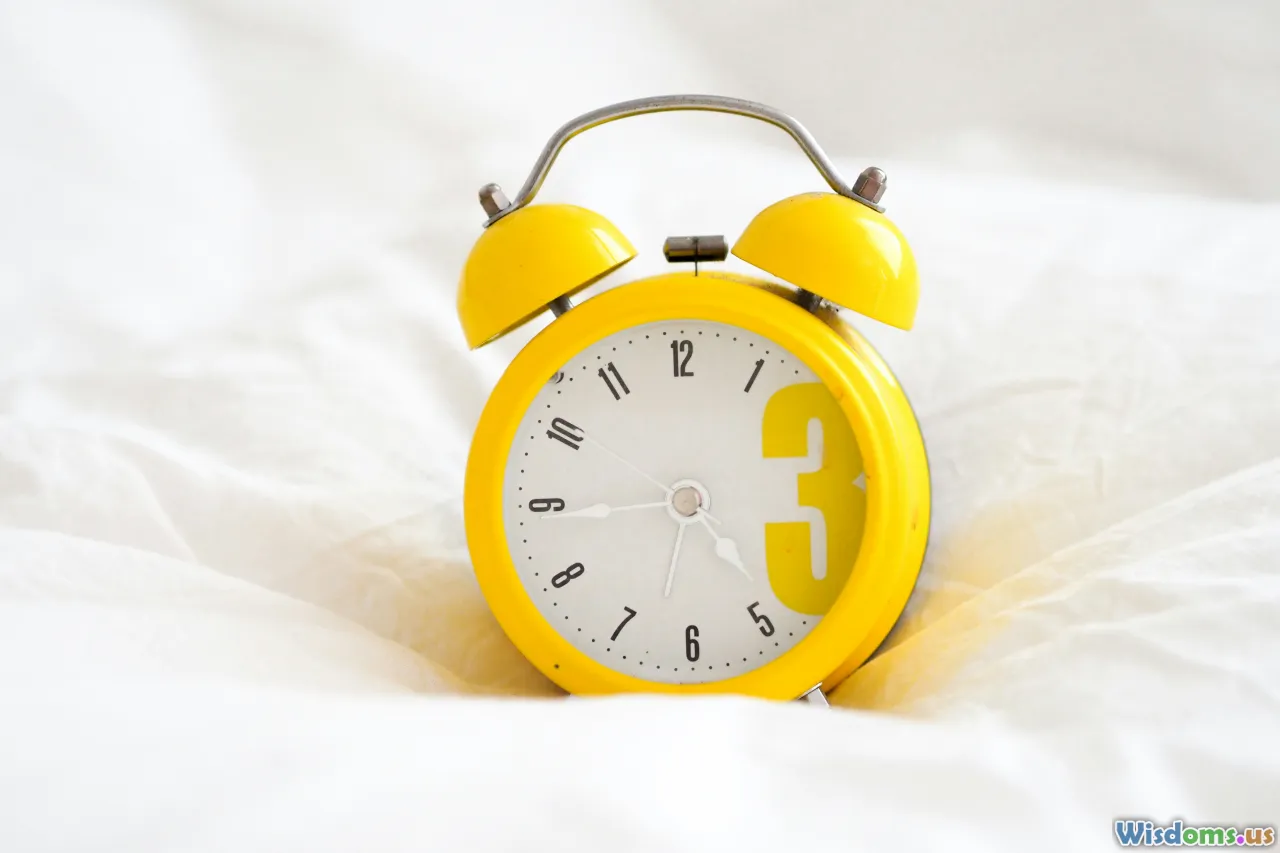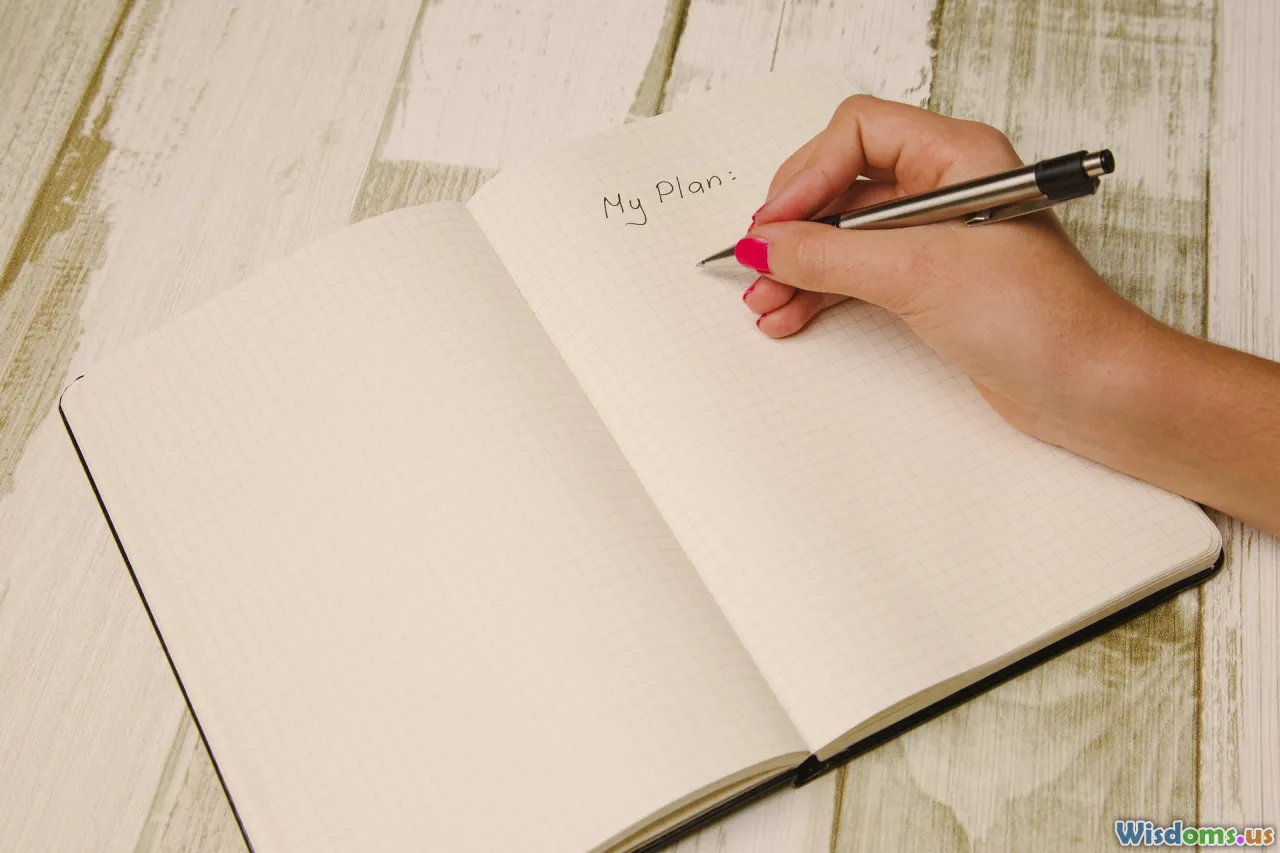
Master Your Morning Routine For Low Stress Days
15 min read Discover how to craft a personalized morning routine for calmer, more productive days and reduced stress. (0 Reviews)
Master Your Morning Routine For Low Stress Days
The way you start your morning sets the rhythm for your entire day—a fact observed by psychologists, productivity experts, and the many high achievers who swear by meticulously crafted routines. It's not about waking up at a particular hour or blindly copying someone else’s habits; it’s about finding a sequence that aligns with your unique needs and reduces stress, clearing a steady path from sunrise to sundown.
Let’s explore a pragmatic guide to mastering your mornings, packed with proven strategies, insightful techniques, and actionable tips backed by both science and real-world examples.
Understand the Science Behind Morning Stress

Stress in the morning isn’t merely a matter of willpower. The human body naturally elevates levels of cortisol, the so-called “stress hormone”, within 20–30 minutes after waking—a phenomenon dubbed the cortisol awakening response (CAR). This surge is intended to help shake off sleepiness, but if you add email notifications, rushed routines, and poor planning, your body interprets these signals as threats, exacerbating the pressure.
Example: In a 2018 study published in the Journal of Occupational Health Psychology, workers who felt out of control during their mornings tended to experience higher stress and reduced productivity throughout the workday.
Takeaway: Understanding your body’s natural rhythms allows you to implement supportive routines rather than resistance-prone strategies.
Set a Consistent Wake-Up Time

Irregular wake-up times are among the biggest contributors to disrupted circadian cycles, leading to groggy mornings and reduced cognitive performance.
Step-by-step Tips to Establish Consistency:
- Pick a Realistic Wake-Up Window: Aim for a wake-up time you can maintain, even on weekends. A difference of no more than 30 minutes between weekday and weekend wakeup is ideal.
- Leverage Natural Light: Exposure to sunlight promptly after waking helps reset your body clock. Open your curtains or, for early risers, consider a sunrise-simulating alarm clock.
- Prioritize Sleep Hygiene: Going to bed at about the same time each night, minimizing caffeine in the evening, and creating a calming bedtime ritual collectively support smoother mornings.
Example: Arianna Huffington, founder of The Huffington Post, is an advocate for consistent sleep schedules, attributing much of her professional clarity to aligning sleep and wake cycles.
Avoid Technology for the First 30 Minutes

Your phone buzzes. Instinctively, your thumb scrolls through notifications, headlines, emails—the stress cycle has already begun. This overwhelming flood of demands sets off anxiety before the day even begins.
How-To:
- Set Boundaries: Turn off non-essential notifications from apps before bedtime and place your phone out of arm’s reach.
- Create Analog Rituals: Brew coffee or tea mindfully, jot down intentions in a paper journal, or meditate for five minutes. Give your thoughts space before you connect digitally.
Fact: According to a 2019 study by Frontiers in Psychology, participants who delayed smartphone use for at least 30 minutes after waking reported notably lower stress ratings throughout the morning.
Start With Small Wins to Build Momentum

The concept of "keystone habits"—introduced by Charles Duhigg in The Power of Habit—tells us that certain routines can trigger chain reactions of positivity. Winning your morning with small, achievable tasks infuses confidence, decreases stress, and creates an upward spiral of productivity.
Practical Small Wins:
- Make Your Bed: Admiral William H. McRaven’s famous commencement speech posits this simple act as a foundation for order and discipline.
- Hydrate: Drinking a glass of water upon waking jumpstarts your metabolism and brain function.
- Five-Minute Tidy: Clear clutter from your workspace or kitchen—visual order translates to mental clarity.
Case Study: Successful entrepreneurs like Tim Ferriss emphasize easy-to-achieve wins, arguing it reduces decision fatigue and sets a positive tone.
Move Your Body—Even If Only Briefly

Physical movement in the morning does not have to mean a full workout session. Simply stretching, walking, or practicing yoga floods your body with feel-good endorphins and relieves persistent muscle tension.
Actionable Ideas:
- Dynamic stretching: Spend 5-10 minutes stretching, focusing on areas that feel sluggish after sleep.
- Light activity: Consider a quick walk around your block or two minutes of jumping jacks—both have been shown to increase alertness and improve cognitive function.
- Yoga or Tai Chi: Mindful movement activates the parasympathetic nervous system, promoting relaxation and grounding.
Research Insight: A 2021 review by the British Journal of Sports Medicine concluded that brief morning exercise correlates with improved mood and reduced perceived stress for the remainder of the day.
Nourish Yourself With Purpose

Skipping breakfast or grabbing something sugary on-the-go spikes blood sugar and then just as quickly depletes it, feeding a cycle of fatigue and irritability. Instead, build a quick, balanced meal into your morning, focusing on nutrients that foster sustained concentration and stable energy.
Quick & Healthy Breakfasts:
- Overnight oats with seeds and berries—rich in fiber and antioxidants.
- Greek yogurt parfait—protein-packed and easy to prepare in advance.
- Green smoothie—combine spinach, frozen fruits, and plant-based protein for a nutrient-dense start.
Fact: A 2019 large-scale study in the International Journal of Environmental Research and Public Health found that regular, wholesome breakfast eaters reported 20% lower daily stress levels than those who skipped or ate high-sugar alternatives.
Map Your Priorities for the Day

Instead of trying to tackle everything at once, clarify your top three priorities for the day. Over-scheduling or keeping vague intentions breeds anxiety, while written clarity turns plans into manageable action.
How-To:
- Write Instead of Type: Physically jotting down your goals (in a planner or on sticky notes) helps lodge them in your memory and fosters accountability.
- Prioritize Using the Eisenhower Matrix: Distinguish between what's urgent and important—avoid getting pulled into busyness devoid of true necessity.
- Build Buffers: Acknowledge unexpected interruptions. Allocating brief gaps between tasks helps you accommodate surprises without spiraling into stress.
Example: Former President Dwight D. Eisenhower managed immense responsibility with the now-famous matrix technique, targeting significant items without succumbing to trivial distractions.
Carve Out Time for Mindfulness

Mindfulness practice—be it meditation, breathing exercises, or a moment of quiet savoring—interrupts ruminative thinking and readies you mentally for what lies ahead.
Simple Mindfulness Strategies:
- Box Breathing: Inhale for four counts, hold for four, exhale for four, hold for four—a Navy SEAL favorite to ease stress quickly.
- Guided Meditation App: Ten minutes with apps like Calm or Insight Timer can increase emotional resilience.
- Gratitude Practice: Write down three things you’re grateful for. Psychologist Dr. Robert Emmons’ research links this to sturdier stress tolerance and greater happiness.
Case Study: Oprah Winfrey credits a morning gratitude ritual for her ability to maintain perspective and positivity amid a packed schedule.
Limit Decision Fatigue With Pre-Planning

If your mornings feel rushed and scattered, the culprit may not be the time available but rather the sheer number of decisions demanded before you even leave the house.
Pre-Planning Techniques:
- Outfit Preparation: Lay out your attire the night before—President Barack Obama famously stuck to limited suit choices to preserve mental energy for greater matters.
- Pre-Made Meals: Pre-assemble breakfasts or lunches early in the week.
- Streamline Essentials: Group items like keys, work bag, or water bottle in one designated spot to mitigate frantic searches.
Insight: According to a study by the National Academy of Sciences, repeated small choices erode cognitive resources, leading to poorer decisions as the day progresses. Planning the mundane effortlessly arms you against this wear and tear.
Customize: Honor Your Individual Chronotype

Not everyone is a “morning person,” and trying to force yourself into an ill-suited rhythm often backfires.
Determine Your Chronotype:
- Larks: Naturally wake up early and feel most alert in the mornings.
- Owls: Hit peaks in the late afternoon or evening, so a rigidly early start may breed stress rather than focus.
- Experiment: Use a sleep-tracking app or journal to notice peak focus and build your morning not by the clock but by cycles that suit you.
Example: Research by Dr. Till Roenneberg at Ludwig-Maximilian University supports that productivity and satisfaction both improve when individuals arrange tasks in harmony with their innate chronotype.
Create Rituals You Look Forward To

A low-stress morning isn’t solely about utility; it should also be enjoyable. Small, meaningful rituals infuse the routine with genuine anticipation.
Ideas to Try:
- Five Minutes of Reading or Listening To Music: Ignite your imagination or establish a soothing mood.
- Art or Journaling: Express creativity, even in brief spurts, as a positive trigger for the day’s unfolding mood.
- Tending a Plant or Pet: Interacting with life, even by watering a desk plant, serves as a micro-dose of joy and connection.
Fact: Rituals—no matter how minor—anchor meaning, as detailed by Harvard Business School researchers, showing ritualistic actions increase emotional stability amid uncertainty.
Common Pitfalls and How to Overcome Them

Crafting a smooth morning routine is an iterative process. Here are frequent stumbling blocks, plus fixes that work:
- The Snooze Trap: Hitting snooze repeatedly fragments sleep, making you groggier and frazzled. Place your alarm out of reach—or try apps that require brain-teasing puzzles to switch off.
- All-or-Nothing Thinking: Routines are meant to be flexible. If you miss part of a step, don’t abandon the morning—resume where you can.
- Forgetting to Adjust for Life Changes: Rigid routines break easily. When schedules, living situations, or jobs shift, reassess and adapt your habits.
Example: Olympic gymnast Simone Biles adapts her routine each competition season, keeping basic structures (mental check-ins, prepared snacks) but tweaking details to suit each context.
Seizing control of your mornings won’t eliminate every challenge the day brings, but it arms you with a readiness and calm that persists through setbacks. Make these strategies your own, experiment with new approaches, and watch as your day unfolds with greater clarity, resilience, and—most importantly—less stress.
Rate the Post
User Reviews
Popular Posts



















